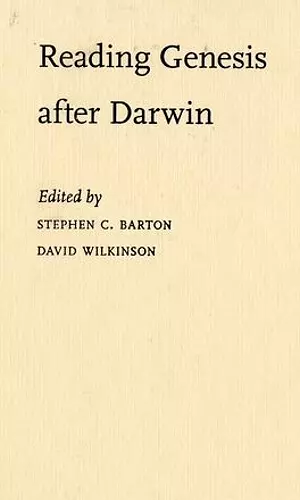Reading Genesis after Darwin
David Wilkinson editor Stephen C Barton editor
Format:Hardback
Publisher:Oxford University Press Inc
Published:19th Nov '09
Currently unavailable, and unfortunately no date known when it will be back

From creationism to The God Delusion, the public dialogue of science and religion either uses the early chapters of Genesis in a naïve and simplistic way or rejects their relevance to contemporary questions. This is reinforced by the myth that Darwin caused a rejection of a literalistic reading of Genesis 1 and from that point most Christian theology lost any confidence in these texts. The truth is far more complex. Jewish and Christian interpretation of the early chapters of Genesis had a long a fruitful history from the earliest times. In the 19th century, many more important issues were at stake than biblical literalism, and there were many different interpretations of how the discoveries of Darwin helped or hindered the reading of the biblical text. Today, theologians are returning to the importance of Genesis as a partner in dialogue with science, gender, and environmental care. As the distinguished authors of the papers in this volume show, far from Darwin burying these ancient texts, he has liberated them to speak in new and different ways. The volume is divided into three parts. In the first, the authors explore how the scriptures themselves were interpreted before the time of Darwin. The fact that non-literal interpretations were standard in early Jewish and Christian thought is often ignored. In fact, these insightful early interpretations have much to teach us today. Part II presents essays on the real history of the Darwin controversies. Exploding the myths about this period, it is fascinating to see how Darwin was welcomed by many religious thinkers. In Part II, the authors apply the insights of Genesis post Darwin to contemporary issues today, such as: what it means to be human, questions of gender, and of evil and environmental care. The final chapter deals with the rise of creationism in its current social context.
It's a strange world when science can be used to dismiss the Bible, or when the Bible can be used to reject science - strange because God's people have long affirmed that the world and the Bible comprise God's Two Books. The challenge, then, is how to read the pages of both faithfully and to discern in their coordinated witness the character and aims of God. For its willingness to take up this challenge, and to do so accessibly and sensibly, Reading Genesis after Darwin is a genuinely important book. In their sketches of how Genesis was read before, during, and after the days of Darwin, these authors demonstrate how people might take the natural sciences seriously and continue to turn to Genesis 1-3 as sacred scripture. * Joel B. Green, author of Body, Soul, and Human Life: The Nature of Humanity in the Bible (2008). *
ISBN: 9780195383355
Dimensions: 156mm x 234mm x 16mm
Weight: 553g
272 pages